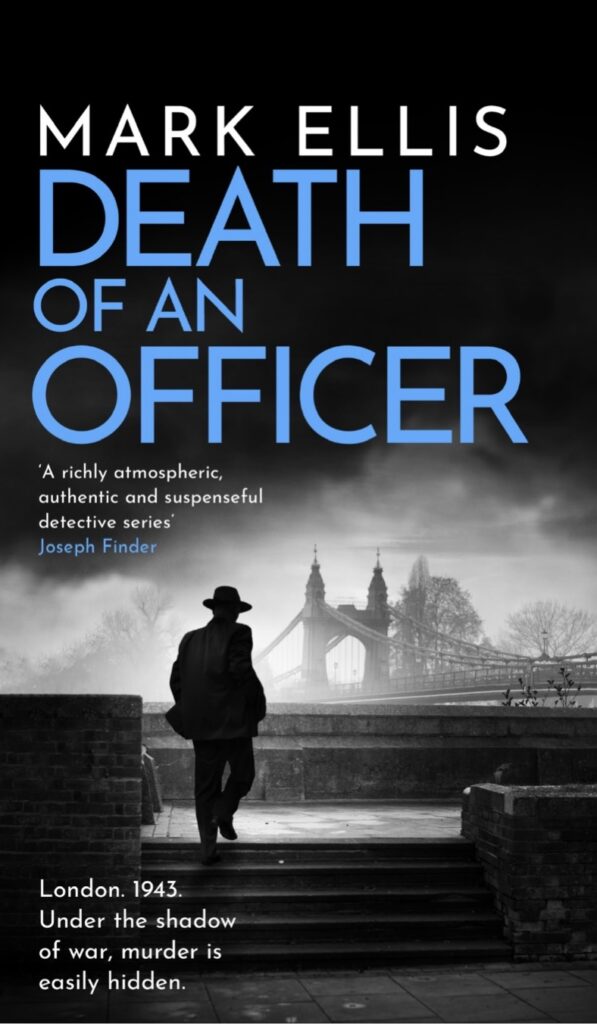Second World War detective series highlights Home Front crime wave
Author Mark Ellis (1972) reveals his research into the crime wave on the Home Front during World War II was one of the inspirations for his novels featuring Scotland Yard detective Frank Merlin.
He spoke with us about the latest book in the series, Death of an Officer, in which DCI Merlin returns to tackle two of his most perplexing cases yet. Set in a bombed-out wartime London, this new instalment plunges readers into a city riddled with crime, corruption, and violence.

Mark, who studied Law at St John’s, was a barrister and later an entrepreneur before becoming a writer.
He says: “People are always surprised when I say there was a crime boom during the war. In fact, recorded crime in England and Wales grew by about 60 percent. So that’s the background to my series. But there are some simple points that can explain it. For example, the blackout obviously made life easier for criminals. There was the Black Market during rationing, which was a huge area of potential for crime. And there was a lot of vice, particularly after 1942. There were all these soldiers and, especially when the Americans came, there was lots of prostitution. People made fortunes.
“There were literally four million Allied and American soldiers roaming around Britain in the run up to D-Day. And when they wanted a bit of fun they would go into London or other cities where there was a huge business providing services that were mostly run by a gang of Maltese crooks.”

Mark has deeply researched wartime crime that emerged from the chaos of those years and has just completed a true crime book, Boom Time, about the era, which has been published on Amazon. It is based on a podcast of the same name that he created for Aspects of History magazine.
During his research, Mark discovered that a storyline he had invented for the latest book turned out to be true.
“In the novel there are people managing upmarket gay nightclubs in different locations in London. Obviously, at the time, homosexuality was illegal. I invented a club that moved around. It wasn’t in a nightclub in Piccadilly. They rented big houses, and they would have big parties, and they’d be there for a while, and then they would move on. It turns out that did actually happen, as I discovered when I was almost at the end of the book.
“I thought that it seemed logical. Lots of gambling clubs, for example, would move around, because you could only get prosecuted if it was a habitual place of gambling. So, I applied the same logic to the world of male prostitution. And that gave me a big chunk of my story.”
Mark weaves this background into his new historical crime thriller, Death of an Officer. It is spring 1943 and as the British nation stands firm against the Nazis, Merlin battles with his team against a wave of criminal activity. In a Kensington flat, a respected doctor is found brutally murdered. On an East End bomb site, the battered corpse of a well-dressed young man is discovered. In a short-handed Scotland Yard, Merlin is required to investigate both cases. He follows trails to a deserted Hackney mansion, to an exclusive gentleman’s club in St James, and to a shadowy group of foreign businessmen. As his enquiries progress, others caught in Merlin’s crosshairs include London gang lords, missing rent boys, MI5 operatives, Maltese vice kings, and some very high-ranking British and American military officers.
Mark had always wanted to write but waited until he had retired from his business career to concentrate on producing a novel.
“When I was in school, I was encouraged by a teacher who said I had a nice turn of phrase and that maybe one day I would make a writer. I always had that at the back of my mind. So, when I sold my business, I decided I wanted to write crime fiction,” he says.
He had also been drawn to write about the war because it had “loomed large” in his childhood.
“My father didn’t die in the war, but he did die because of the war,” says Mark.
“He was on service in West Africa, and he contracted a wasting disease, which eventually killed him in 1960 when I was seven.”
Meanwhile his mother’s stories about wartime intrigued him. “She used to tell me about travelling up to London in the war years for fun weekends, even when there was bombing,” says Mark.
“My mother was working class but as she worked for a railway company, GWR, she had perks like free tickets and cheap accommodation in railway owned hotels. That was how she could afford her London trips in 1944-45 when London was under attack from V2 missiles, known as ‘Doodlebugs’.
“She told me that they weren’t going to allow Hitler to ruin their lives. And that just made me interested in what the attitudes were like, what life was like. The reality is life went on normally. You know, people fell in love, got divorced, killed each other, stole from each other, had fun together, against the background of extremely difficult circumstances, but life went on; that rather attracted me. I put that together with a detective solving crimes during a crime boom and thought that would be quite a good mix. And so far, it’s turned out to be that I haven’t lost that inspiration. There are more stories coming all the time.”
Death of an Officer, by Mark Ellis, is available in paperback, on Amazon Kindle and will soon be available as an audiobook.





